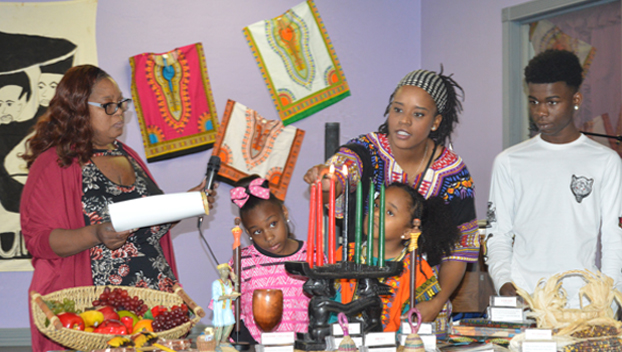Kwanzaa celebration focuses on finding purpose in life
Published 2:00 pm Saturday, December 30, 2017

- Kwanzaa was held on Saturday at Rock Island Baptist Church in Port Arthur. The principle for the day was Nia which is finding one’s purpose and moving forward.
Johnny Hulin, organizer for the Kwanzaa celebration at Rock Island Baptist Church in Port Arthur, said they considered canceling this year’s event due to Tropical Storm Harvey.
However, a compromise was reached. Three organizations — the African American Cultural Society, Love People, Inc. and the Willie Carter Center decided the tradition must carry on and condensed it in one day. Kwanzaa is a seven-day celebration. The gathering for Saturday’s theme was on Nia which is finding one’s purpose and moving forward. There were about 50 people in attendance.
Kwanzaa lasts seven nights, centered on seven principles from the Swahili language, represented by seven symbols.
The other principles are: Umoja for unity, Kujichagulia for self-determination, Ujima for collective work and responsibility, Kuumba for creativity and Imani for faith. Dr. Maulana Karenga created Kwanzaa in 1966.
The program consisted of a short history lesson about Kwanzaa, an explanation of the principles, guest speakers, music and dancing.
There were several youths in the audience. Hulin said children were victims of Harvey and they need an emotional outlet to talk about things and know everything will be alright.
“The kids are amazed to hear things about our past,” he said. “They are spoon-fed a little black history in February (black history month), but that’s it.
Kwanzaa is not just an African American holiday. The seven principles have something for everyone they can practice to be a better person and build a better world.”
Guest speaker Desiree Hamlin, a graduate from the University of North Texas, talked about her struggles of not having her father in her life and how it affected her academics which led to depression.
She stressed the importance of having a father in their children’s life and how she recognized her worth as she studied African American history in college and later becoming a mother.
“I learned we were kings and queens in Africa before colonization,” Hamlin said. “I see myself as a queen — a queen of African descent.”





